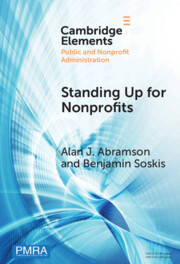1 results

Standing Up for Nonprofits
- Advocacy on Federal, Sector-wide Issues
-
- Published online:
- 23 May 2024
- Print publication:
- 13 June 2024
-
- Element
-
- You have access
- Open access
- HTML
- Export citation

